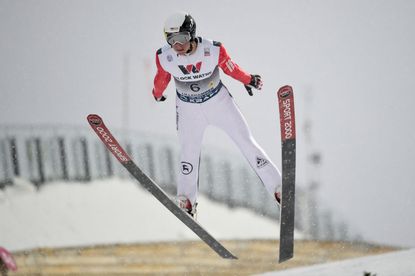Virtual reality has infiltrated Olympic training


Virtual reality headsets may look impossibly dorky — but you know what doesn't? An Olympic gold medal.
The Washington Post reported Tuesday that the U.S. Ski and Snowboard Association has worked for the past two years with the virtual-reality company STRIVR Labs to prepare its athletes for the 2018 Winter Olympics in Pyeongchang, South Korea. Barring secret training operations by other countries, the Post says the U.S. is the first country to use VR in its Olympic training.
Because the Jeongseon Alpine Centre, where the skiing events will be held, is only two years old, VR headset training is especially helpful as most Olympic athletes have only traversed the course a handful of times, the Post explains. The U.S. team took advantage of 2016 pit stop in South Korea during the World Cup to gather its footage, sending one of its coaches barreling down the Jeongseon course over and over again, armed with a 360-degree video camera. STRIVR then made a composite of the coach's various runs and recalibrated the footage to approximate the intensity of an Olympic ski run.
Subscribe to The Week
Escape your echo chamber. Get the facts behind the news, plus analysis from multiple perspectives.

Sign up for The Week's Free Newsletters
From our morning news briefing to a weekly Good News Newsletter, get the best of The Week delivered directly to your inbox.
From our morning news briefing to a weekly Good News Newsletter, get the best of The Week delivered directly to your inbox.
The Post reports that "most of the U.S. team" has had a virtual run down the Olympic slopes. But these VR ski runs can be somewhat nauseating, which makes some athletes reluctant to train with VR. STRIVR tried to mitigate the risk of motion sickness, encouraging athletes to use the VR footage while perched on motion-simulating equipment so that their bodies align more closely with the images they were seeing. Still, "you watch it and you get pretty sick and dizzy," one athlete told the Post.
Read more at The Washington Post.
Create an account with the same email registered to your subscription to unlock access.
Sign up for Today's Best Articles in your inbox
A free daily email with the biggest news stories of the day – and the best features from TheWeek.com
Kelly O'Meara Morales is a staff writer at The Week. He graduated from Sarah Lawrence College and studied Middle Eastern history and nonfiction writing amongst other esoteric subjects. When not compulsively checking Twitter, he writes and records music, subsists on tacos, and watches basketball.
-
 'Good riddance to the televised presidential debate'
'Good riddance to the televised presidential debate'Instant Opinion Opinion, comment and editorials of the day
By Harold Maass, The Week US Published
-
 Caitlin Clark the No. 1 pick in bullish WNBA Draft
Caitlin Clark the No. 1 pick in bullish WNBA DraftSpeed Read As expected, she went to the Indiana Fever
By Peter Weber, The Week US Published
-
 Today's political cartoons - April 16, 2024
Today's political cartoons - April 16, 2024Cartoons Tuesday's cartoons - sleepyhead, little people, and more
By The Week US Published
-
 Empty-nest boomers aren't selling their big homes
Empty-nest boomers aren't selling their big homesSpeed Read Most Americans 60 and older do not intend to move, according to a recent survey
By Peter Weber, The Week US Published
-
 Brazil accuses Musk of 'disinformation campaign'
Brazil accuses Musk of 'disinformation campaign'Speed Read A Brazilian Supreme Court judge has opened an inquiry into Elon Musk and X
By Rafi Schwartz, The Week US Published
-
 Disney board fends off Peltz infiltration bid
Disney board fends off Peltz infiltration bidSpeed Read Disney CEO Bob Iger has defeated activist investor Nelson Peltz in a contentious proxy battle
By Rafi Schwartz, The Week US Published
-
 Disney and DeSantis reach detente
Disney and DeSantis reach detenteSpeed Read The Florida governor and Disney settle a yearslong litigation over control of the tourism district
By Peter Weber, The Week US Published
-
 Visa and Mastercard agree to lower swipe fees
Visa and Mastercard agree to lower swipe feesSpeed Read The companies will cap the fees they charge businesses when customers use their credit cards
By Peter Weber, The Week US Published
-
 Reddit IPO values social media site at $6.4 billion
Reddit IPO values social media site at $6.4 billionSpeed Read The company makes its public debut on the New York Stock Exchange
By Peter Weber, The Week US Published
-
 Housing costs: the root of US economic malaise?
Housing costs: the root of US economic malaise?speed read Many voters are troubled by the housing affordability crisis
By Peter Weber, The Week US Published
-
 Feds cap credit card late fees at $8
Feds cap credit card late fees at $8speed read The Consumer Financial Protection Bureau finalized a rule to save households an estimated $10 billion a year
By Peter Weber, The Week US Published